#CMacceptance
Explore tagged Tumblr posts
Text
CreativeMornings Ottawa: May 2023
Jane Porter on acceptance and the importance of leading with love
Accepting reality is not always easy. From climate change to social injustice to the decline of democracy, the greatest challenges of our time can seem threatening, overwhelming, or just plain impossible to solve.
On the CreativeMornings Ottawa stage at Arts Court, Jane Porter invited us to feel the magnitude of these challenges, and to lead with love and compassion. Doing so starts with connection: with ourselves, our communities, and the land we call home.
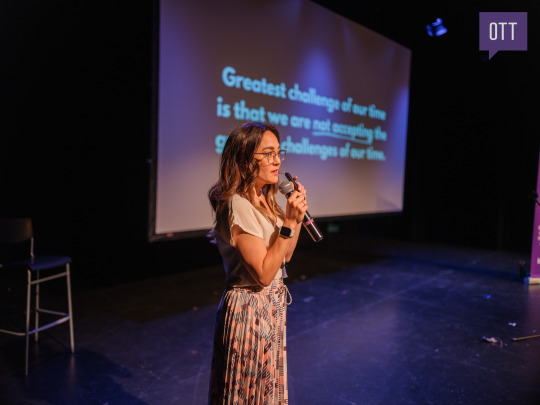
Connection is something Jane has consciously cultivated throughout her life. This includes in her community work as co-founder of Impact Hub Ottawa and through convening stakeholders as a sustainability consultant. Today, as an integral facilitator and founder of Bridge Building Group, Jane brings people together to have tough conversations that spark meaningful change and heal divides.
The journey to acceptance and understanding can be uncomfortable. In her talk, Jane used a photography metaphor to break down her approach:
Zoom out to see the big picture and break free from your existing echo chambers.
Zoom in and reflect on who you really are and what motivates you.
Reframe why you do what you do. For example, Jane realized she pursued a career in sustainability because it gave her a sense of connection with others and to the land.
Focus and realize that two things can be true at the same time, depending on who you’re asking and what they’ve chosen to lock their viewfinder on.
Find a tripod to support your passions and purpose. When you feel like you’re on shaky ground, dig deeper into learning and your relationships to find the support you need.
Finally, Jane suggested it’s time we find a new lens. Western society is oriented around growth mindsets and economic success. There is much to learn from Indigenous worldviews that compel us to think of the next seven generations, and consider the well-being of all our relations, human and otherwise.
The challenges faced by the world are not going to solve themselves. To accept—and act— during this period of existential threats we must first ground ourselves by pausing, getting curious, and finding ways to respond thoughtfully and with compassion for ourselves, our communities, and the planet.
Thank you to Jane for sharing her personal journey and for providing such food for thought on a Friday morning. You can learn more about Jane’s professional facilitation work on her website or on LinkedIn. Watch Jane’s full talk here.
2 notes
·
View notes
Text
May ’s Theme is Acceptance.
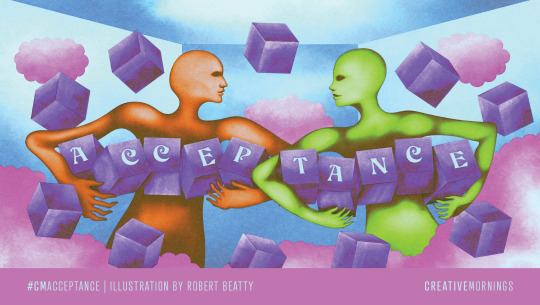
Acceptance is the act of surrendering to our reality, without judgment or fear. There are many things in our lives that cause us discomfort or pain. We attempt to change or resist them, to no effect. So we wave a big stick, keeping them at bay like a wounded animal.
Acceptance is weaving into your story what once caused you pain — and still might, to this day. You welcome that creature into your home, tend to its wounds, and feed it out of your hand. Acceptance is knowing that this feral animal lives side by side with your tender house cat of a heart, always.
Embracing what cannot change can help you gather the energy to change what must. Accept these truths: you cannot make another person love or see you. You did not finish everything before the sun set on another day — and you didn’t need to. Every moment will pass, the blissful and the excruciating. It’s the hardest lesson, but one we need the most: the grace to let go. Our Lexington chapter chose this month’s exploration of Acceptance and Robert Beatty illustrated the theme.
5 notes
·
View notes
Text
Rosanna Viano on Acceptance
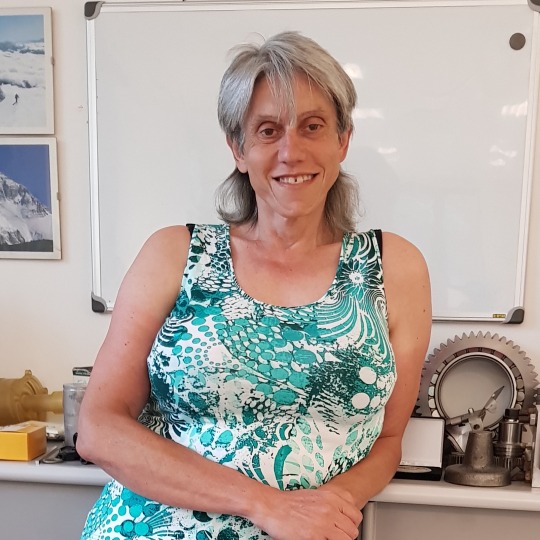
Nata a Torino nel 1966. "Born to test": l'identità primaria è quella di ingegnere; laureata al Politecnico in Ingegneria Aeronautica, è Principal Engineer per le prove sperimentali su moduli per motori aeronautici.
Su questo substrato si è sviluppato un percorso di identità di genere: transgender MTF, in passato attivista, presidente del Circolo Maurice a Torino e componente di altre associazioni locali e internazionali.
Oggi è anche impegnata nei temi di Inclusion&Diversity all'interno dell'azienda, nelle sue più varie sfaccettature.
Nel tempo libero si dedica al fai da te, all'elettronica, ai viaggi e alla montagna: è istruttrice di alpinismo e impegnata nella gestione di una sezione del Club AIpino Italiano.
0 notes
Photo


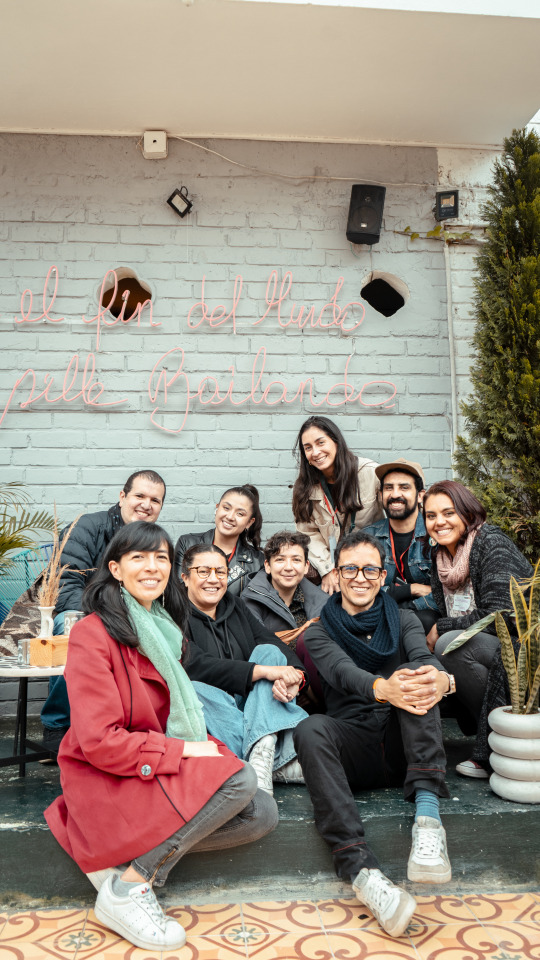
ESCRIBIR PARA SER OTRO
Pido un taxi por una aplicación con el tiempo justo. Al instante me confirma que un conductor se encuentra a 4 minutos. Estos se convierten en 8 y el vehículo continúa en el mismo punto del mapa.
Voy a llegar tarde.
Lo cancelo y pido otro que aparece en 3 minutos. Minutos después, cuando el carro toma una avenida principal me encuentro con un trancón monumental.
Ahora si que voy a llegar tarde.
¿Qué hacer? Nada o, mejor dicho, aceptar la situación, es decir, lo que la vida le dé la gana entregarme.
Acceptance es el tema de mayo para CreativeMornings y la persona encargada de hablarnos sobre él es la escritora Laura Ortiz.
Laura estudió literatura en la Universidad Javeriana, trabajó como promotora de lectura y escritura a lo largo de toda Colombia y cuenta con una Maestría en Escritura Creativa de la UNTREF.
En el año 2021 la editorial Laguna Libros le publicó Sofoco, su primer libro de cuentos, que cuenta con ediciones en España, Argentina, Chile, México e Italia, y con el que ganó el Premio Nacional de Narrativa Elisa Mujica.
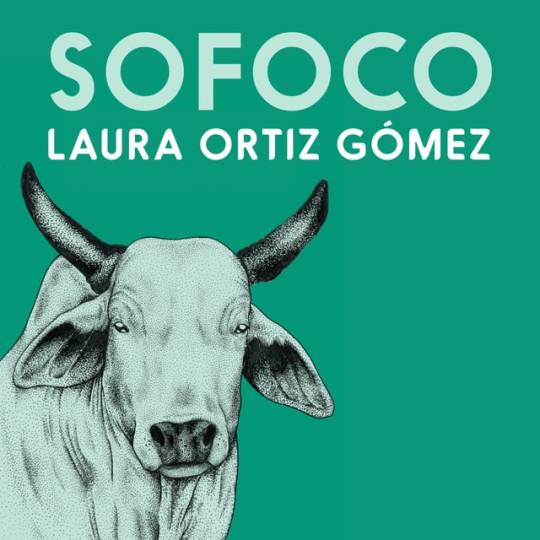
Ya en El Jardín, el espacio anfitrión que por primera vez recibe a la comunidad creativa, aprovecho para conversar un poco con ella antes de que empiece el evento.
Le pido una definición de aceptación y responde: “Dejar de poner resistencia a los ritmos de la vida”.
Laura afirma que no puede vivir sin las palabras y su lugar preferido en la tierra es cualquiera en el que se encuentre Mostaza, su gato. “Dónde está mi gato está mi hogar”, concluye.
Le pregunto si tiene algún libro preferido y hace cara como de ¿Acaso está loco?, pues cree que es una pregunta que no tiene respuesta, ya que son muchos o, más bien, la respuesta cambia de acuerdo a la temporada y lo que esté viviendo.
Por eso me cuenta sobre lo que está leyendo o ha leído hace poco: “Ahora leo Yo maté a un perro en Rumania de Claudia Ulloa, que está muy chévere”. También me dice que hace poco leyó El corazón del daño de María Negroni y Vista desde una acera de Fernando Molano Vargas. “Creo que a él deberíamos leerlo más”, dice.
Si de comida se trata en este momento está fascinada con las frutas colombianas, en especial la papaya y la granadilla.
Ya son más de las 8:30 a.m y es hora de dar comienzo a la charla. Laura pasa al frente y lo primero que cuenta es que estudió literatura con la ilusión, mal puesta o extraviada, de ser escritora.

Ya en la carrera le tuvo miedo a la escritura, pues se dio cuenta que el ejercicio académico literario está muy separado de la vida y su realidad.
Se sentía frustrada porque sentía que no estaba haciendo nada que la conectara con su territorio, con su país.
Por eso decide hacer un semestre social en Nariño, Pasto, con comunidades indígenas. Ese es un lugar que siente especial y en el que se cruzan muchas cosas: “En pasto puedes bailar currulao y música andina. Coexisten lo blanco, los mestizo y lo indígena. Es un volcán rodeado de lagunas. Es un lugar muy intenso en el que se reúnen muchas fuerzas del país”, cuenta en una entrevista.
Tiempo después renuncia y se va a Argentina detrás de un amor. Allá atraviesa una crisis y se siente perdida, así que decide cursar una maestría en escritura creativa, pero más para hacer amigos y tener con quien conversar. Al final resulta ser una experiencia maravillosa.
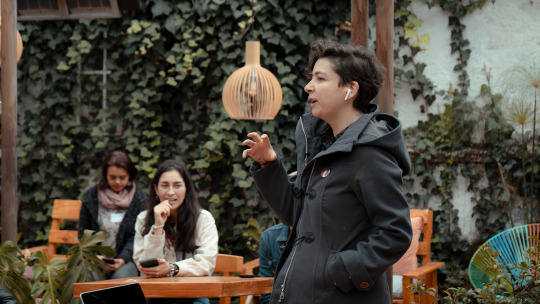
Es allí donde escribe Sofoco, su primer libro de cuentos, como trabajo de grado, una obra que más allá del conflicto colombiano, tiene que ver con la esperanza o resistencia que cargan sus personajes.
Laura se pregunta: “¿Cómo hice yo para aceptar las fuerzas creativas, exorcizar el miedo y darme voz nuevamente?”
Nos cuenta sobre María Negroni una poeta argentina que dice que la poesía es un monstruo de dos cabezas: pensamiento racional y una cabeza irracional e intuitiva.
La segunda, dice Laura, nos da miedo porque trabaja sobre lo indeterminado y el misterio.
“Desde el colegio nos insisten en que hay dos tipos de escritura, la buena y la mala, y en la academia de literatura ese clasismo es mucho peor, pues se insiste en una jerarquía de buena y mala literatura que obliga a reverenciar a ciertos autores.”
“El papel de la racionalidad es peor, pues es la que a cada rato te dice: No tienes nada por decir. Esto es inmundo ¡bórralo ya! Todo ya está escrito, tú cállate, ¿qué vas a decir?”
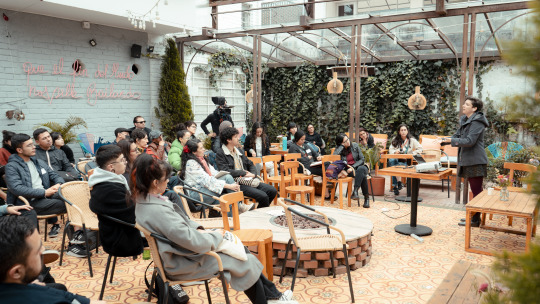
“Gran parte del ejercicio creativo es aprender a lidiar con esa policía interior”.
Menciona la cita apócrifa que se le atribuye a Hemingway: Escribe borracho, edita sobrio, que puede traducirse como: El inconsciente escribe el consciente edita. Algo que se debe tener en cuenta al momento de escribir. “Si apuestas por una estructura muy precisa, no vas a permitir que el texto te diga cosas que tú no sabes.”
El truco en este proceso tiene que ver con aceptar perder el control de la obra y de lo que va a pasar con ella, pues no hay manera alguna de controlar como va a ser leído un texto o si va a ser publicado o no.
La voz extraña
Laura nos habla de la voz extraña, un concepto que toca el poeta argentino Fabian Casas en su texto Perder el control, similar al que toca Rimbaud en su poema Yo es otro.
El poeta francés siempre trató de situarse fuera de sí mismo al momento de escribir y pensaba que solo se puede comprender el mundo cuando se mira bajo los ojos de otro.
Con respecto a eso Laura piensa lo siguiente: “Trato que mis personajes sean el otro que me habita. Intento que no sea lo que yo me imagino que es un campesino en el páramo, sino que trato de dar un espacio hasta que empiezo a sentir una voz que ya no es Laura”.
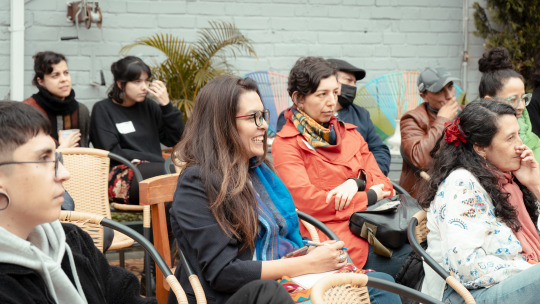
Se trata de ver a la escritura como la voz extraña. una voz que nos excede. De esa manera escribir es escuchar, rendirse, aceptar lo otro que me habita. “Mirar a la escritura de esa forma resulta liberador, porque se tiene la idea de que escribir solo consiste en decir cosas interesantes e inteligentes”, nos cuenta.
“Consiste en estar dispuestos a ser atravesados. Dejarse atravesar por personajes, historias, por los otros, y eso es algo que da miedo. Da miedo dejarse llevar por esa voz extraña, que tiende a la locura, a fuerzas que nos sobrepasan.”
“Nunca descubriré por qué se escribe ni cómo no se escribe”, dice la escritora Marguerite Duras. “Escribo porque tengo miedo de escribir, pero tengo más miedo a no escribir”, refuerza Gloria Anzaldúa.
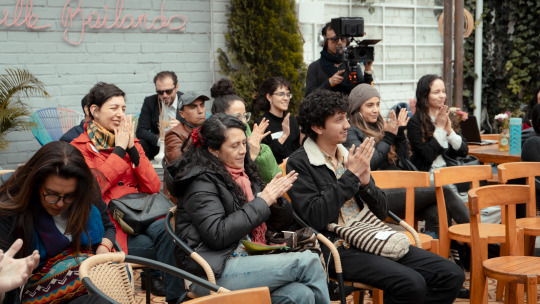
Laura cree que tenemos casi un deseo sexual hacia lo creativo, pero que nos da miedo relacionarnos con lo otro, porque sabemos que nos va a modificar de alguna manera.
Para finalizar su charla, nos invita a dejarnos habitar por el otro o la otra, que siempre tiene algo por decirnos.
Creative Mornings le quiere dar gracias a todas las personas y empresas que hicieron posible esta charla: A El jardín por acogernos en sus instalaciones y brindarnos un delicioso desayuno; a Osa imagen por la producción audiovisual del evento; A Rafael Franco por el registro fotográfico, y como siempre a ti y a toda la comunidad creativa por sus asistencia y apoyo a cada evento.
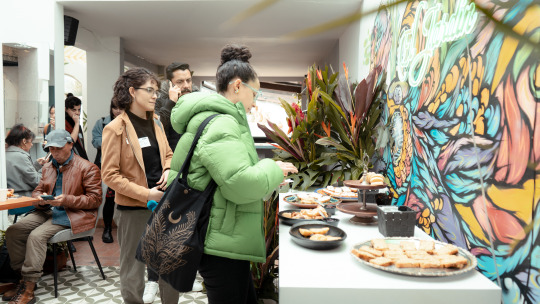

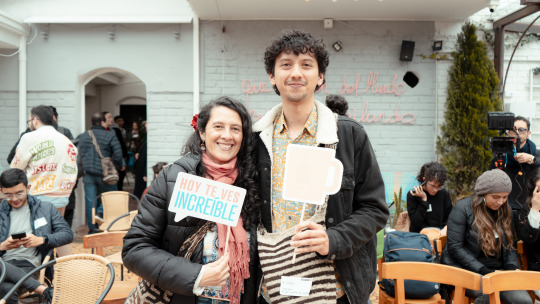
Espera pronto en redes sociales toda la información del evento de Junio bajo el tema reverie (ensueño)
Escrito por Haki Storytelling.
2 notes
·
View notes
Text


ACCEPTANCE | Roscoe Burnems
"If you consume no other content, give yourself the gift of Roscoe's words." -Michelle Mercurio, CMRVA host
This powerful talk from Douglas Powell/ Roscoe Burnems, Richmond's First Poet Laureate tackles the topics of racism, privilege, gender roles, his son being a butterfly, the five things they don't tell you about grief, love and god and love, and more for #CMAcceptance.
To our friends at Frontier - thanks for accepting our invitation to partner with us in these creative efforts.
Venue Visual Arts of Richmond
Videography The Erwin Creative
Photos Mahogani Moore, @moorethanflicks
Full Album Here
In-kind partners that fuel this engine of generosity Worth Higgins & Associates, Lavender Hill, The Anderson Accounting & Advising Group
Give yourself the gift of watching the full talk HERE.
0 notes
Photo

May’s global CreativeMornings theme ACCEPTANCE will be discussed by Jared Moossy on Friday the 19th.
Our musical guest with be Christina Marrs.
Join us for Cuvée Coffee & breakfast tacos.
We’ll be meeting at Peace Park.
All thanks to our partner thirteen23.
Register to get your free ticket here.
We now accept the hashtags #CMacceptance & #CMATX
0 notes
Text
youtube
That was Markus Salcher about Acceptance at Talent Garden Vienna.
Strong personality with a great vision ❤️
Video Credits: Manuel Hahn
#viecm
#viecm#youtube#creativemornings#cmacceptance#creativemornings vienna#vienna#creative mornings#creativemorningsvienna#Markus salcher#talent garden
2 notes
·
View notes
Text

May ’s Theme is Acceptance.
Acceptance is the act of surrendering to our reality, without judgment or fear. There are many things in our lives that cause us discomfort or pain. We attempt to change or resist them, to no effect. So we wave a big stick, keeping them at bay like a wounded animal.
Acceptance is weaving into your story what once caused you pain — and still might, to this day. You welcome that creature into your home, tend to its wounds, and feed it out of your hand. Acceptance is knowing that this feral animal lives side by side with your tender house cat of a heart, always.
Embracing what cannot change can help you gather the energy to change what must. Accept these truths: you cannot make another person love or see you. You did not finish everything before the sun set on another day — and you didn’t need to. Every moment will pass, the blissful and the excruciating. It’s the hardest lesson, but one we need the most: the grace to let go. Our Lexington chapter chose this month’s exploration of Acceptance and Robert Beatty illustrated the theme.
0 notes
Text

Unser Thema im Mai ist „Acceptance“.
Was hat Akzeptanz mit neuen Technologien zu tun?
Darum geht es am Freitag, 26. Mai, und zwar im livMatS Pavillon im Botanischen Garten. Gemeinsam mit Sabrina Livanec, Forscherin im Exzellenzcluster livMatS („Living, Adaptive and Energy-autonomous Materials Systems“) und Co-Leiterin der Plattform Nexus Experiments an der Universität Freiburg, gehen wir unter anderem folgenden Fragen nach: - Warum ist die Akzeptanz neuer Technologien und Materialien wichtig? - Wie können bei Technologieentwicklung unterschiedliche Anspruchsgruppen einbezogen werden? - Wie kann Partizipation zu Akzeptanz beitragen? - Und: Wie können Methoden aus der Psychologie dabei helfen, das alles zu erforschen?
Wir freuen uns über alle, die kommen und das Thema „Akzeptanz“ gemeinsam aus einem unerwarteten Blickwinkel betrachten. Frühstück und Input sind wie immer kostenlos, eine Anmeldung ist erforderlich.
Wir begrüßen euch am 26. Mai ab 8 Uhr im livMatS Pavillon im Botanischen Garten. Der Pavillon befindet sich direkt beim Eingang Lerchenstraße.
Das Thema "ACCEPTANCE" wurde von CreativeMornings/Lexington ausgewählt und von Robert Beatty illustriert.
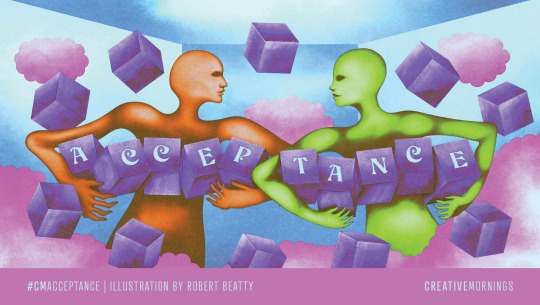
0 notes
Text

📣 Announcing May 's speaker, Andrea Truedson Bodó! 📣
Andrea changed her course in life and became a storyteller artist. She created the "DNA ties of blood story" as Jubilee artist for Gothenburg’s 400 years anniversary. This creative Inner Development Leadership Goals visionary charity project is told by art and storytelling together with her son.
In her upcoming talk you will find how her work and legacy are "about following her heart calling, finding courage and purpose. The intention of creating a compassionate world with ethical leadership using creativity”. Transylvania born and Hungarian descent, Andrea carries the wisdom from her ancestors' tales from World War II, when history repeats itself with the war in Ukraine.
Learn more about this sustainable creator, storyteller and artist here: @bodoartinsta
We hope to see you on the 26th of May QueensLab for her "Accepting what You can not change, after a life changing accident!" talk. Tickets go live on Monday! 🎟️
☕ Breakfast & mingle: 07:30 – 08:25
🎤 Talk: 08:25- 09:00
0 notes
Text
#CMacceptance

MAY'S THEME IS ACCEPTANCE.
Acceptance is the act of surrendering to our reality, without judgment or fear. There are many things in our lives that cause us discomfort or pain. We attempt to change or resist them, to no effect. So we wave a big stick, keeping them at bay like a wounded animal.
Acceptance is weaving into your story what once caused you pain — and still might, to this day. You welcome that creature into your home, tend to its wounds, and feed it out of your hand. Acceptance is knowing that this feral animal lives side by side with your tender house cat of a heart, always.
Embracing what cannot change can help you gather the energy to change what must. Accept these truths: you cannot make another person love or see you. You did not finish everything before the sun set on another day — and you didn’t need to. Every moment will pass, the blissful and the excruciating. It’s the hardest lesson, but one we need the most: the grace to let go. Our Lexington chapter chose this month’s exploration of Acceptance and Robert Beatty illustrated the theme.
0 notes
Photo

Our global theme for MAY is ACCEPTANCE. It was chosen by our Lexington chapter and illustrated by Robert Beatty.
We now accept the hashtags #CMacceptance & #CMATX
Acceptance is the act of surrendering to our reality, without judgment or fear. There are many things in our lives that cause us discomfort or pain. We attempt to change or resist them, to no effect. So we wave a big stick, keeping them at bay like a wounded animal.
Acceptance is weaving into your story what once caused you pain — and still might, to this day. You welcome that creature into your home, tend to its wounds, and feed it out of your hand. Acceptance is knowing that this feral animal lives side by side with your tender house cat of a heart, always.
Embracing what cannot change can help you gather the energy to change what must. Accept these truths: you cannot make another person love or see you. You did not finish everything before the sun set on another day — and you didn’t need to. Every moment will pass, the blissful and the excruciating. It’s the hardest lesson, but one we need the most: the grace to let go.
0 notes
Text

May’s theme is Acceptance
May’s theme is Acceptance, chosen by CreativeMornings Lexington and illustrated by Robert Beatty. Acceptance is the act of surrendering to our reality, without judgement or fear. There are many things in our lives that cause us discomfort or pain. We attempt to change or resist them, to no effect. So we wave a big stick, keeping them at bay like a wounded animal.
Acceptance is weaving into your story what once caused you pain — and still might, to this day. You welcome that creature into your home, tend to its wounds, and feed it out of your hand. Acceptance is knowing that this feral animal lives side by side with your tender house cat of a heart, always.
Embracing what cannot change can help you gather the energy to change what must. Accept these truths: you cannot make another person love or see you. You did not finish everything before the sun set on another day — and you didn’t need to. Every moment will pass, the blissful and the excruciating. It’s the hardest lesson, but one we need the most: the grace to let go.
0 notes